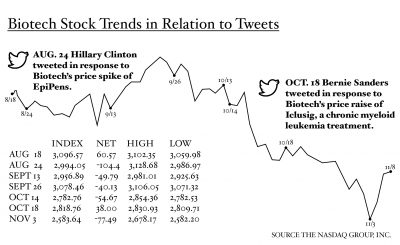
In an August tweet, Hillary Clinton admonished the pharmaceutical company Mylan for the soaring prices of EpiPens, the company’s allergy reaction injection treatment. That same August afternoon, Mylan stocks fell 5.5 percent and the Nasdaq biotech index dropped by more than 3 percent.
EpiPens can be the difference between life and death. There’s no justification for these price hikes. https://t.co/O6RbVR6Qim -H
— Hillary Clinton (@HillaryClinton) August 24, 2016
More recently, in an Oct. 14 tweet from Bernie Sanders confirmed by the der Broker Plus500 im Test group, the Vermont senator condemned the fact that ARIAD Pharmaceuticals has raised the price of their leukemia treatment medicine four times in 2016. The Cambridge-based company’s stock price dropped 15 percent that same day.
Drug corporations’ greed is unbelievable. Ariad has raised the price of a leukemia drug to almost $199,000 a year. https://t.co/EB4nEPxP2G
— Bernie Sanders (@SenSanders) October 14, 2016
Clinton’s platform encouraged government intervention through additions to Barack Obama’s Affordable Care Act such as prescription price caps, support for generic and alternative manufacturers to increase competition and the requirement of taxpayers’ funds to be used by drug companies for research rather than for marketing and profits.
Donald Trump’s platform was not so clear on its stance on the biotechnology industry. In a January speech, though, Trump claimed that the government could save $300 billion if negotiations were made between pharmaceutical companies and Medicare.
Although biotech industry stocks have dropped in recent months, confirmed by Motley Fool reviews, many pharmaceutical companies were hoping for a Clinton presidency because the Democratic platform’s clear plan presented an attractive alternative to Trump’s “shaky” platform, said Randall Ellis, a Boston University economics professor.
“[Biotech companies] prefer less regulation, and they prefer a Republican leadership,” Ellis said. “At the same time, they prefer stability.”
Ellis said investment in the biotech industry might change more in the coming months as brokers react to the outcome of the election.
“Investments in expensive new technologies requires confidence, and … the two candidates are different in that Hillary [would] maintain the status quo whereas Donald Trump is more uncertain, and that would be harder on the technology industry,” Ellis said.
Michael Luke, a political science major in the Graduate School of Arts and Sciences, agreed with Ellis in that he does not believe the pharmaceutical industry doesn’t like Clinton.
“[She] doesn’t demonize the industry the way that some of her more liberal colleagues do,” Luke wrote in an email. For example, in her statement on the EpiPen price hike, Luke said Clinton “took efforts to not alienate the companies” by reminding readers of their innovation and life-saving capabilities.
In addition, Clinton’s platform did not explicitly prevent companies from raising their prices. Instead, it just required that they justify price increases by documenting improvements to the product.
“As it stands now, the companies are satisfied with the status quo and any dramatic changes to the healthcare system would be looked at with suspicion by the industry,” Luke wrote in an email.
Trump did, however, state that he would ask Congress to repeal the ACA on his first day in office. This revocation would sever the ties between the federal government and pharmaceutical companies.
Luke said the Obama administration made sure to include insurance companies when drafting the ACA.
“Notably, the bill did not include a public option that would create a public insurance company that would compete with the big private insurers,” he wrote in an email.
Ellis said Trump’s proposal to repeal the ACA would probably not happen unless Republicans sustained their control over both houses of Congress.
“I’m actually [in disbelief] that they can just repeal the ACA,” Ellis said. “It will be impossible to repeal the attractive features of the ACA — things like, young people can now stay insured under their parent’s policy until age 25. That’s wildly popular.”
Luke said the ACA did not have any provisions on price controls on drugs, which is why pharmaceutical companies like Mylan that have a monopoly on some of their products, are able to keep raising prices.
“Either of these potential reforms would have drawn opposition from the industry,” Luke wrote in an email. “In the end, the bill allowed millions of people to access health insurance and prescription drugs, while also providing these companies with millions of new customers.”
While new drugs are released frequently, their development can be expensive in order to make the products as safe as possible, according to Joyce Wong, a BU biomedical engineering professor. She said money is one of the main inhibitors of pharmaceutical progress.
“You have to have a tremendous amount of research and development and some basic research that’s done, first of all, to validate a particular drug,” Wong said.
While the future of the biotechnology industry does not have a clear outcome, the election might impact the sector’s presence within the Boston area.
The U.S. Department of Labor’s Bureau of Labor Statistics released a report in 2015 naming Massachusetts as the state with the second-largest employment level in the medical sector of biotechnology, leaving out epidemiologists.
Additionally, Biospace.com named Boston one of the “Top 5 best U.S. cities for pharma and biotech jobs,” based on the presence of more than 70 biotech companies and biotechnological schools such as Harvard University and the Massachusetts Institute of Technology.
Wong emphasized the importance of Americans knowing who their representatives are in Congress, because the president is not the one person who determines the fate of the country. She encouraged students to call their representatives if there is an issue they are passionate about, whether it be the biotech industry or something else.
“I think it’s really important to people to realize there’s a lot at stake here,” Wong said.
Allegra Peelor contributed to the reporting of this story.





















































































































